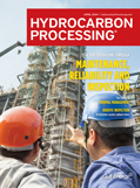Safety
Mitigate transient/hydraulic surge in liquid pipelines with nozzle check valves
Liquid pipelines often come across hydraulic transients, which can damage pipelines and associated equipment (i.e., pumps, valves, stations, etc.).
Hydrocarbon Processing 2020 Awards WINNERS
<i>Hydrocarbon Processing</i>, the downstream processing sector’s leading technical publication, has announced the winners for its third annual awards.
When toxic risk cannot be prevented, mitigate consequences of H2S with fluid curtains
Toxic risk preferably should be controlled according to Kletz’s inherent safety principle, which consists of some preventive golden rules, notably <ital>minimize, substitute, moderate</ital> and <ital>simplify</ital>.
How valve upgrades can improve tank and terminal facility operations
Tank and terminal facility profitability ultimately rests on a handful of key performance indicators (KPIs). The ability to maximize tank capacity utilization—while minimizing the time it takes to load and unload ships, trucks and rail cars—drives the bottom line. All those transfers must happen quickly and accurately, while avoiding product contamination.
Hydrocarbon Processing Awards 2020—FINALISTS
This special section details all finalists within each category for the fourth annual <ital>HP</ital> Awards. The winners will be announced on Oct. 1.
Project Management: Reduce installation schedule for column trays
The implementation of a project schedule must avoid slippage, which can lead to budget overruns and delays in commissioning and production. Conversely, a reduction in project schedule results in an early startup of the plant, creating advantage for stakeholders. Customers often demand reductions in schedule timelines, which can be difficult for engineering, procurement and construction (EPC) contractors to implement. New innovations like concurrent engineering, modular construction, prefabricated pipe racks and structures, etc., are already in practice.
Reliability: Phased reopening of reliability improvement businesses
Like many thousands of educational and operator training-related endeavors, reliability improvement training was abruptly suspended when the COVID-19 pandemic interrupted daily life as it was known prior to 2020.
Editorial Comment: Optimizing operations and recognizing achievements
Over the next two months, <ital>Hydrocarbon Processing</ital> will host two separate events for a global audience. One will gather the brightest minds in the industry to share the latest innovations and technologies in the industry, while the other will recognize the leaders in advancing the industry toward safer and more reliable, sustainable and profitable operations. Both events—<ital>Hydrocarbon Processing’s</ital> IRPC and the HP Awards—will be streamed on digital platforms and free to view.
Advanced analytics drive IIoT success
Refineries and petrochemical plants face similar challenges in daily operations. Each must mitigate risk, anticipate maintenance, optimize operations and minimize expenses. To achieve these goals, plant personnel rely heavily on data to drive decisions.
Project Management: Four tips for navigating a shutdown, turnaround or outage successfully
In the oil and gas sector, managing a shutdown, turnaround, or even an outage is an unavoidable requirement.

- Haldia Petrochemicals awards ethylene plant digitalization contract to Lummus 5/2
- INEOS completes purchase of LyondellBasell's EO&D facility in Bayport, Texas (U.S.) 5/2
- HPLNG delays commissioning of Chhara LNG import terminal in India 5/2
- Shell records nearly $8-B Q1 profit on the back of refining, chemicals/products and LNG divisions 5/2
- Water treatment specialist SurfCleaner supplies Norwegian energy giant Equinor 5/2
- U.S. White House: Russia shipping fuel to North Korea above UN cap 5/2




